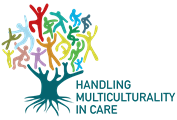Project summary
The populations of Europe are rapidly ageing. Due to economic development, advances in healthcare and medicine and improved lifestyle, we have experienced a continuous increase in life expectancy during the last century. One of the consequences is a growing need for caregivers in eldercare. At the same time, the European countries are getting more multicultural and in many workplaces staff who care for the elder no longer constitutes an ethnic homogeneous group but consists of employees with widely different cultural backgrounds and different norms and values.
This creates challenges within a discipline where values, attitudes and communication are very important to the work environment. For example, in nursing and caring, staff gets very close to the persons in need of care, breaking through personal barriers and entering the intimate sphere. Differences in attitudes and approaches to the care of the elder among colleagues with different ethnic backgrounds often give rise to misunderstandings and frustration in everyday life, sometimes even growing to dissociation and isolation of specific groups of staff. The European countries are lacking tools to improve elder care employees' ability to manage multicultural workplaces and the aim of the project was to contribute to strengthening the competences of employees in the eldercare sector in managing value systems based on different cultural background - both with regard to inter-collegial communication and teamwork and with regard to the communication skills of nursing staff in their contact with their clients.
Project Objectives
- More experience in collaboration between education and employment
- Caregivers have achieved new key competences regarding their understanding of different value systems and cultural background
- Caregivers have learned new methods to support their future opportunities for further training in acquisition of new key competences
- New teaching methods to support improvements in formal and informal vocational education are developed with employees as co-developers
- A strengthened development within the care sector that rely on a broad European basis in relation to differences in culture, organizational, economic and technological framework
- Development within the care sector's vocational training is facilitated through the transfer of knowledge and experience from other sectors
- Interaction between vocational training with learning in practice in different national contexts are improved
About the Partnership
The partnership consisted of 9 partners from each of the contributing countries: Denmark, Italy, Germany and the UK. In each country an elder care provider organisation and an educational institution is participating in the delivery of the project with the main coordinating group - a large Danish Union, representing elder care employees. The partners brought into the project their experiences from care giving, training/education of caregivers, working as a union for caregivers, decision making in the field and general experience from working with multiculturality issues and dissemination. Professor Dominique Bouchet from the Department of Marketing and Management at the University of Southern Denmark was subcontracted as an expert to assist with possible approaches. Prof. Bouchet has carried our research over a number of years in cultural differences in workplaces and the training material he has developed in this field served as inspiration for partners in their development of their own training material targeting specifically the care sector.
Methods
The project partners developed in each of their countries training programs and training materials that were tested three times. In the periods between the training sessions, materials and programs were evaluated, adjusted and further developed. There is mutual understanding among the partners, that the training developed must be rooted in everyday practice to achieve maximum impact. The evaluation of the project included assessments of each stages and aspect. Working places and educational institutions cooperated closely in the development of the training. Managements and team leaders of care organisations were involved in the recruitment of staff for the activities and were consulted on how to ensure the sustainability of the results.
The development of the training programs in each country had a common transnational starting point, there was mutual inspiration and a high degree of synergy effect but the training courses ended up very differently in each country as a result of the different national contexts. We consider this as one of the strengths of this project.
The Products
The products are now available for use and can be found in the material section of this website. Some are specific to a particular country and is produced in the mother tongue of that country, however elements of each course material can be used across EU countries as they are more generalized according to organisations need as they were co-produced by the beneficiaries (i.e., the care workers and nurses themselves) . This is why the material and tools are relevant for educational institutions use as well as for the care organizations that were the project partners. The results were also widely across each sectors for more general usage and users from these sectors are, right now, integrating the results into their activities.

